As a company that works closely with news providers to enable them to engage with their audiences and monetize their content, we, of course, pay attention to the "big players" in the news industry. The BBC, while not perfect, is undeniably a pioneer in the world's media landscape. This year, its 100th year in broadcasting, we felt inspired by its century-long tradition of providing the public with quality news to explore how news consumption has changed across the generations who grew up with this influential broadcaster. From the social, mobile, and digital revolutions, news consumption and thus creation has certainly undergone many changes, but we wanted hard data.
With the help of
Opinium
, we asked 2000 UK residents a series of questions about what role the news plays in their daily lives. Here are some of the intriguing results that our team gathered:
Consumption Frequency
News used to be available primarily in a daily newspaper. Today, audiences can receive new updates every minute. This shift in medium is visible not only in the technology used to consume the news but also in the rate at which UK adults check it. According to our study, 83% of those surveyed check the news at least 1x a day. While we see an increase in the rate at which consumers check the news, another significant statistic is that despite the availability of news, 3% of UK adults never check the news at all. This lack of desire for information could be attributed to news fatigue - a topic explored in more detail in this year's
Reuters Digital News Report.
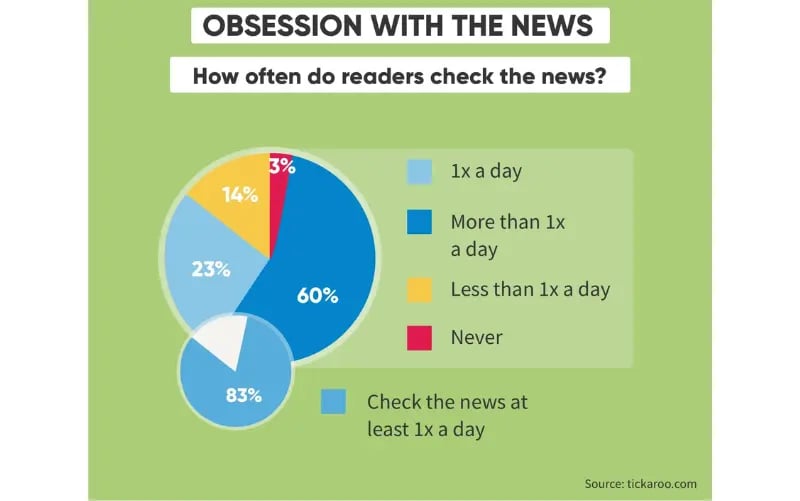
Current Technology
While consumers check the news frequently, technological developments within the past decades have contributed to the ease at which news is accessed. Younger generations tend to consume their information on their mobile devices, while 26% of those surveyed said they consume most of their news on TV. Of that 26%, however, 48% of those TV consumers were over 55, demonstrating a clear generational divide.
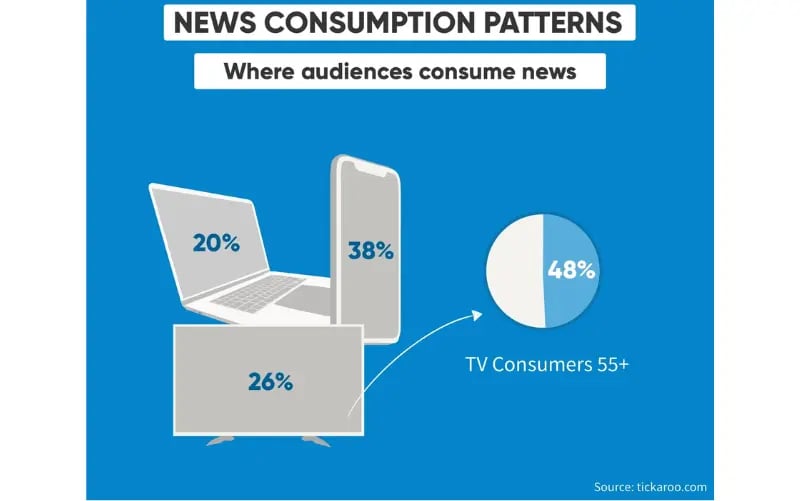
Location
With the mobile revolution, news has become even more accessible than before. We asked UK adults for some of the strangest places they have checked the news. Not only did 49% say that they check the news in bed, but 6% even admitted to checking the news after sex. Other social activities did not deter people from getting the latest updates, as 24% of surveyed adults checked the news in the pubs, and even 3% checked it while in the mountains.
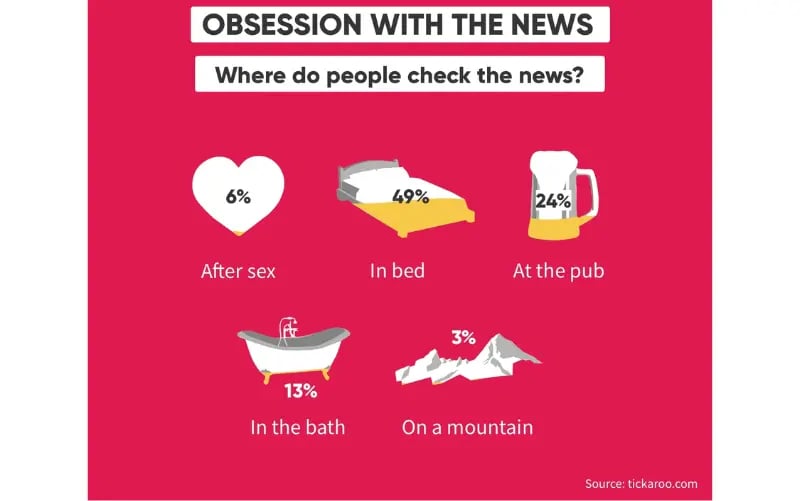
Live Updates
One element that could be related to the frequency and the locations in which news is consumed is the importance of live updates for news consumers in the UK. 7 out of 10 adults shared that receiving live updates about politics and sports was very important to them. Historically, live sports updates were some of the first live news transmitted via the liveblog format. Today, politics is also a popular topic that gains high traffic on publishers' live coverage offerings.
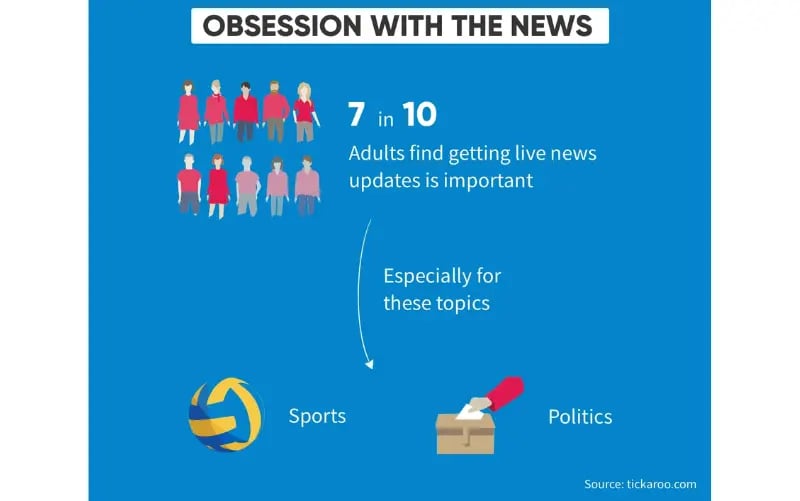
Looking for a way to provide more live news updates to your readers? Test the Tickaroo Live Blog software for FREE for 14 days.
Lack of Trust
Despite the desire for live updates, a general lack of trust in the media also appears to be growing. While all the generations surveyed mentioned a significant lack of confidence in the media (38% overall), almost half of the Gen Zers and younger Millennials said that they have some level of distrust in the media. Another alarming finding is that only 62% of UK adults trust the media most of the time. News publishers must seek new ways of regaining trust, especially with younger generations if they want to be able to continue to serve their populations effectively.
Metaverse and the Future
Despite a significant distrust in the media, consumers don't see the news disappearing from their daily lives in the future altogether. Along with sports and politics, tech is the 3rd most popular news topic for UK adults overall. Especially the subject of tech and how it will affect news consumption in the future appears to be gaining traction. 27% of UK adults think that news providers will report in the Metaverse within 5-10 years.
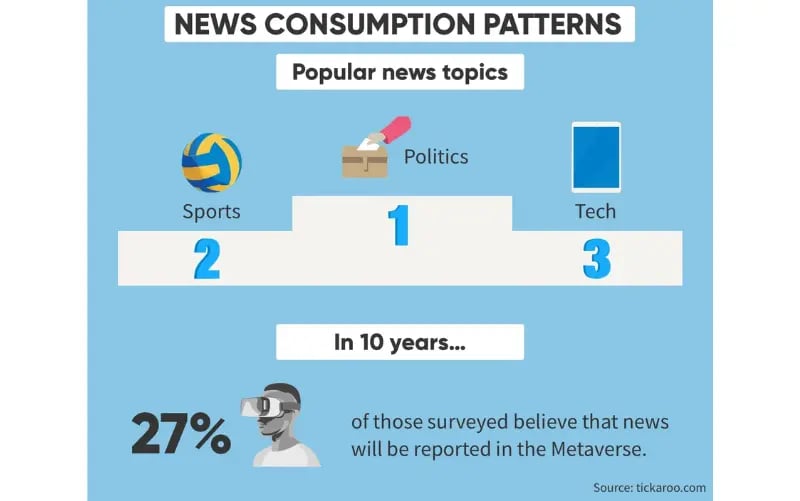
Conclusion:
Changes in technology and current events are affecting the way audiences consume news. That's why publishers need to continue adjusting formats and strategies to connect with audiences and try to regain the trust and attention of those they are losing.
The BBC's long history has demonstrated how important it is to change with the times to continue to captivate audiences. While it's by no means perfect, its ability to learn from mistakes and make necessary changes has kept the broadcaster relevant all these years. From working with Tik Tok directly to fix its failing channels on the platform to building vertical screens for mobile video coverage in their new studio, the BBC shows that it recognizes that addressing technological shifts within the media landscape is not optional. It's imperative to stay relevant, as they have done for the last 100 years.
The BBC's long history has demonstrated how important it is to change with the times to continue to captivate audiences. While it's by no means perfect, its ability to learn from mistakes and make necessary changes has kept the broadcaster relevant all these years. From working with Tik Tok directly to fix its failing channels on the platform to building vertical screens for mobile video coverage in their new studio, the BBC shows that it recognizes that addressing technological shifts within the media landscape is not optional. It's imperative to stay relevant, as they have done for the last 100 years.

